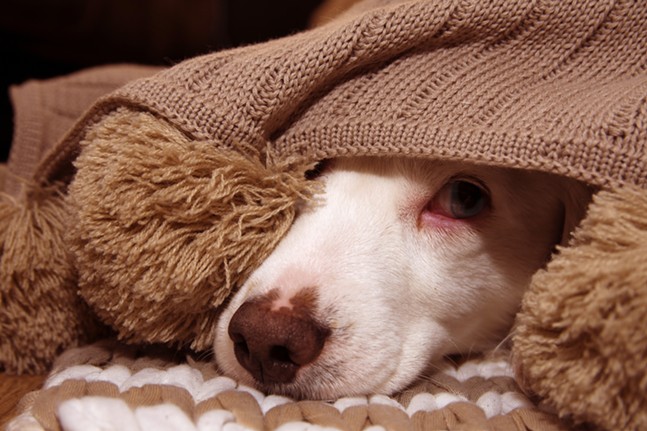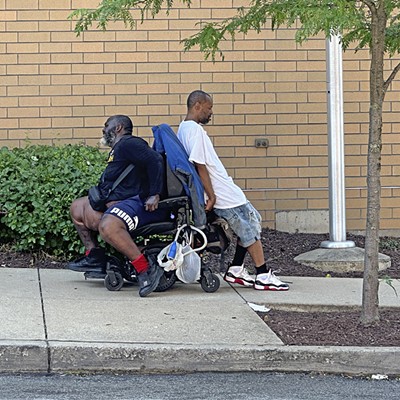"I came from Texas and we use to have big firework shows that weren't far from our house that was pretty scary," says Snider. "We would find out what times the shows would be and figure out giving him medication about an hour ahead of time."
She would prep her dog the same way with storms by checking the weather forecast, especially during the summer, and medicating him before one rolled in.
In Pittsburgh, however, it's not as easy to offer preventative care for pets disturbed by loud noises. While storm tracking can be done, setting off fireworks in city limits has become a trend.
"In my neighborhood [now], we hear them off and on every night," says Snider. "In Dallas, in city limits, pretty much anywhere in Texas, you couldn’t put off fireworks [yourself], you had to go out into the country."
Pittsburgh City Paper editor Lisa Cunningham's cats have never really been upset in previous years when fireworks went off in her North Side neighborhood, during Pittsburgh Pirates games, or even during normal Fourth of July activities. But, she says, people have been setting them off nightly for at least three weeks straight, sometimes lasting hours into the night and after midnight. One of her cats, who is normally extremely social and affectionate, has been terrified.
"He's so friendly, he's one of those cats who sit in the basement window and greets neighbors who walk by our house," Cunningham says. "Now, every night, as soon as the first bang gets set off, he starts shaking and runs and hides, and I can't find him until morning."
From June 1 through June 21 this year there were 137 fireworks complaint calls to the City of Pittsburgh Public Safety Department. During the same time frame in 2019, there were 28.
Summer, in general, has always been a stressful time for pets dealing with pop-up thunderstorms and Fourth of July celebrations. Animal shelters and rescue organizations receive an influx of admissions during the summer, particularly during the days following July 4, because pets want to put distance between themselves and loud noises. Their instinct is to flee.
"Our total intake for 2019 was 8,572 animals, so those four summer months account for almost 40 percent of our annual intake," says Melissa Smith, Humane Animal Rescue's director of marketing.
So what is there to do with anxious pets around this time? Snider shared an article with CP that she wrote in 2019 detailing ways to help animals cope. Many of the tips include advance planning, like getting a visible pet ID in case they do run and talking to your veterinarian about anxiety medication if appropriate.
"If your pet’s anxiety during storms is minor or if you’re not sure how they will react, consider using Feliway spray on a bandana for your cat," Snider notes. "For dogs, try an Adaptil diffuser, Adaptil spray on a bandana or an Adaptil collar. These are available in most major pet supply stores. Begin using the product a day or two before the fireworks. The spray needs to be reapplied every four to five hours."
When unexpected fireworks or storms are happening, it can also help to close curtains, put on white noise to try and mask the sounds, and even play with your pet, if they are in the mood to do so.
"Help them associate fireworks with fun so maybe it won’t be so scary next year," says Snider. "If they can’t play, that’s okay too."
The most important thing you can do yourself is to stay as calm and relaxed as possible. Animals can read moods and often mirror the emotions of their human companion. If you are anxious, they will be too.
"You want to comfort them if they need it, but do it in a way that shows them you’re not afraid and that everyone is safe," she says. "Being overly worried about their fearfulness can make it worse."
When asked about using CBD, which has grown in popularity for both people and pets alike, Snider said the general consensus with vets at Humane Animal Rescue is to not use it.
"It's kind of a snake-oil type thing right now," she says. "There's not enough research for us to recommend it. Maybe someday."
"Our pets have an Endocannabinoid System just like humans so using CBD is going to help them the same way it helps us; relieving anxiety and symptoms of pain," says Rhonda Broadway, one of the owners of Lawrenceville-based CBD shop, Total Peace and Wellness. The shop carries CBD pet products such as Pet Tinctures for dogs and cats, and dog treats and CBD chews for dogs to help relieve joint pain associated with age. "We have a pet section on our site. For anxiety, I definitely recommend the tincture or the Zen Dog Treat."
Whatever you choose to use or not use, hopefully, one of these tips will help your furry friend be a little more comfortable this summer.













